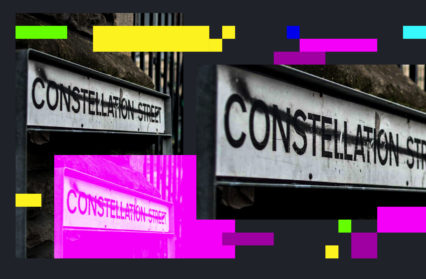Marine Furet reviews National Theatre Wales’s Constellation Street, part of their Network programme of digital work that was launched in response to the COVID-19 lockdown, and finds a play that is successful in mixing gritty social realism and tragedy through four dramatic monologues.
The latest offering from National Theatre Wales’s digital output, Network, Constellation Street, is an online reading of Matthew Bulgo’s promenade play, first staged at the Other Room in 2016. Each of the play’s four monologues – “The Good Samaritan”, “The Knowledge”, “Somebody Else’s Child”, and “The New Girl” – is read out by a different actor through Zoom. All scenes are set in a different Cardiff location: a pub, a hotel bedroom, a taxi, and atop a train station, over the course of a night in which all characters explore ghosts from their past.
In the play’s first rendition, audience members were invited to wander around the venue from one act to the other, and restricted to three out of four acts. Our experience as viewers in 2020 is considerably less sensory and mobile, but we do get access to the play’s full contents.
The performers are reading straight out of Bulgo’s script, and it is a testament to the quality of his writing that none of the heart-rending stories that make up the play are in any way less affecting. Each story hauntingly raises the question of good, evil, and predestination, through unflinching portrayals of revenge, infidelity, cowardice, and incest. As the characters come to grips with their atavistic demons, I am struck by how much the play seems to borrow from the rules of Greek tragedy, portraying protagonists neither good nor bad, but rather hit by unforeseen circumstances. The heroine of “The New Girl”, performed by Rebecca Hayes, tells us a story apparently made up of accumulated traumas and adverse circumstances. Abandoned by a father who never acknowledged her, and faced with increasingly traumatic circumstances, she still believes that everyone ‘gets their own’ in the end. The brutality of her story is far beyond the confines of my own experience, yet there is an incredible familiarity to her portrayal, and a relatability to her tone. Hayes’ delivery is both wry and earnest, moving and chummy, addressing her invisible interlocutor with a closeness, suggesting a relationship much more established than it is eventually revealed to be. Of course, in another sense, her interlocutor is no other than her invisible audience, who is made to look at her at ground level.
Throughout all four acts, each monologue explores another modality of the relationship between actor and viewer. The play’s engaging reflection on the role of the audience gives the camera an immersive power which plays up to the script’s strengths, putting the viewer in increasingly uncomfortable moral positions. The protagonist of “The Good Samaritan” (whose part is read by Rakie Ayola), instantly creates a cordial atmosphere between herself and her viewer, who she treats as an invisible patron in a bar, only to disarm us further as her story of goodwill starts taking on increasingly disturbing aspects. Julian Lewis Jones, the performer narrating “The Knowledge” similarly establishes an initial sense of trust as he plays a taxi driver telling his life story to a customer. Jones filmed himself reading in a car, and the restrictive angle afforded by his camera soon gives the scene a claustrophobic air, when the knot of his story starts untangling in increasingly dramatic ways. The premise of “Somebody Else’s Child”, which portrays a man (Matthew Gravelle) telling his story to an unknown interlocutor in a hotel room, is perhaps the most potentially threatening. The narrator self-consciously attempts to undo the sense of menace implied by his settings, but his account of his life, and his final words to the viewer, both leave the spectator with a troubling feeling.
Lost souls though they might be, all the characters eventually engage in various forms of self-justifications even as they purport to be simply confessing past sins of cowardice and omission. The script cleverly relies on the protagonists’ lingering moral ambiguity and guilt, inviting us to stand in a paradoxical position of proximity and distance, compassion and horror, in the face of the circumstances afflicting them. The play’s mix of gritty social realism with a tragic tinge is a successful one. It gives Cardiff, the spectral protagonist of this performance, a gothic air that appears to come straight from the city’s ability to shelter the darkest stories alongside the brightest sparks of light, though very few of those are eventually allowed to shine through. Rebecca Hayes’ final words seem to promise some degree of hope, yet they are quickly dampened by her immediate expression of fatigue, as if collapsing under the weight of hers and other characters’ stories.
The initial set-up of the play as a promenade offered a degree of flexibility in the way in which viewers could encounter the actors and their stories. Here, the numbering of each act implies a more orderly succession which reveals the play’s hidden structure and echoing system. In an age of forced sensory deprivation, the unique feeling that comes from witnessing a performance on stage, is not entirely compensated by the play’s unmissable qualities. Tic Ashfield’s sound compositions, however, succeed in highlighting the play’s ominous moments, reinforcing the shadowy undertones of the characters’ narratives.
Zoom is by no means an actor’s ideal set-up, and the news currently offer little hope that theatres will open anytime soon. One can lament this situation and acknowledge that Constellation Street, despite the digital constraints its director, Dan Jones, had to take into consideration, is a strangely moving piece.
More information about Constellation Street and NTW’s Network programme can be found here.
Marine Furet is a writer at Wales Arts Review.
For more Wales Arts Review coverage of National Theatre Wales, including news, reviews, and interviews, click here.












